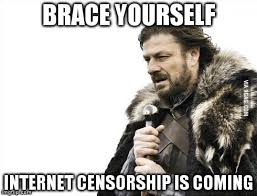Court Rejects Another Lawsuit Alleging that Internet Companies Suppress Conservative Views–Freedom Watch v. Google
 This is one of many “conservative” lawsuits claiming that Internet companies engage in bias and discrimination against them. Though they often blame Section 230 for this allegedly discriminatory behavior, this lawsuit fails without any reference to Section 230 at all. Anyone thinking that Section 230 reform will change the outcome in cases like this does not understand the law.
This is one of many “conservative” lawsuits claiming that Internet companies engage in bias and discrimination against them. Though they often blame Section 230 for this allegedly discriminatory behavior, this lawsuit fails without any reference to Section 230 at all. Anyone thinking that Section 230 reform will change the outcome in cases like this does not understand the law.
* * *
Freedom Watch claims that, due to content suppression of conservatives, its growth and revenues have plateaued or declined. Loomer is a self-described “conservative investigative journalist and political activist” with 260k Twitter followers. She claims Facebook suspended her and Twitter banned her. (See my blog post on a different lawsuit by her). Larry Klayman represents the plaintiffs. The district court judge was a favorable draw for the plaintiffs, but the opinion still emphatically rejected the lawsuit. In a short but decisive opinion, the appeals court affirms.
Standing. “The general allegation that the Platforms conspired to suppress Freedom Watch’s audience and revenue, combined with Freedom Watch’s representations that its audience and revenue declined, suffices to establish standing.”
First Amendment Violations. “Freedom Watch contends that, because the Platforms provide an important forum for speech, they are engaged in state action. But, under Halleck, ‘a private entity who provides a forum for speech is not transformed by that fact alone into a state actor.’ Freedom Watch fails to point to additional facts indicating that these Platforms are engaged in state action and thus fails to state a viable First Amendment claim.” Note that Trump’s anti-Section 230 Executive Order repeatedly uses phrases similar to “important forums for speech” to justify its actions. This opinion reinforces how legally bogus those arguments are.
Sherman Act Section 1. “Freedom Watch argues that we should infer an agreement primarily from the Platforms’ parallel behavior, as each company purportedly refused to provide certain services to Freedom Watch. But, as the district court explained, parallel conduct alone cannot support a claim under the Sherman Act. Freedom Watch puts forth two additional factors that it claims suggest conspiracy: that the Platforms are pursuing a revenue-losing strategy and that they are motivated by political goals. But Freedom Watch does not explain why either factor tends to show an unlawful conspiracy, rather than lawful independent action by the different Platforms.”
Sherman Act Section 2. “The only anticompetitive conduct that Freedom Watch alleges (without supporting factual allegations) is that the Platforms conspired against it to suppress conservative content, but not that the Platforms conspired to acquire or maintain monopoly power.”
DC Human Rights Act. The court says that this law only applies to physical places of public accommodation, and the plaintiffs did not allege the particular physical places in DC where the defendants violated the law.
* * *
In a short opinion, the court hits three critical points:
- Plaintiffs alleging online bias against conservatives have relatively easy ways to plead Article III standing.
- The Internet giants aren’t state actors. This legal proposition goes back two decades, and the Supreme Court has cemented it with the Halleck case. When Internet giants suppress speech, they are not engaged in illegal “censorship” or deprivation of First Amendment-protected rights. Instead, they are exercising their editorial discretion, and their editorial rights are protected by the First Amendment.
- The Internet giants aren’t “places of public accommodation” for purposes of DC’s civil rights law. That means “conservatives” (and everyone else) can’t weaponize that law against Internet services. Compare another recent case, Wilson v. Twitter, that implied (without concluding) that Twitter could be a place of public accommodation for federal civil rights. Even so, the Wilson case held that Section 230 would preempt the anti-discrimination claims nevertheless.
Case citation: Freedom Watch Inc. v. Google, Inc., No. 19-7030 (D.C. Cir. May 27, 2020)
Selected Related Posts About State Action Claims
- Another Suspended Twitter User Loses in Court–Wilson v. Twitter
- First Voters Reject Tulsi Gabbard, Then a Judge Does–Gabbard v. Google
- YouTube Isn’t a State Actor (DUH)–PragerU v. Google
- Facebook Still Isn’t Obligated to Publish Russian Troll Content–FAN v. Facebook
- Vimeo Defeats Lawsuit for Terminating Account That Posted Conversion Therapy Videos–Domen v. Vimeo
- Russia Fucked With American Democracy, But It Can’t Fuck With Section 230–Federal Agency of News v. Facebook
- Private Publishers Aren’t State Actors–Manhattan Community Access v. Halleck
- Your Periodic Reminder That Facebook Isn’t a State Actor–Williby v. Zuckerberg
- Section 230 Protects Facebook’s Account and Content Restriction Decisions–Ebeid v. Facebook
- Court Tosses Antitrust Claims That Internet Giants Are Biased Against Conservatives–Freedom Watch v. Google
- Twitter Isn’t a Shopping Mall for First Amendment Purposes (Duh)–Johnson v. Twitter
- YouTube Isn’t a Company Town (Duh)–Prager University v. Google
- Facebook Defeats Lawsuit By User Suspended Over ‘Bowling Green Massacre’–Shulman v. Facebook
- Yelp, Twitter and Facebook Aren’t State Actors–Quigley v. Yelp
- Facebook Not Liable for Account Termination–Young v. Facebook
- Online Game Network Isn’t Company Town–Estavillo v. Sony
- Third Circuit Says Google Isn’t State Actor–Jayne v. Google Founders
- Ask.com Not Liable for Search Results or Indexing Decisions–Murawski v. Pataki
- Search Engines Defeat “Must-Carry” Lawsuit–Langdon v. Google
- KinderStart Lawsuit Dismissed (With Leave to Amend)
- ICANN Not a State Actor

Pingback: Section 230 Ends Demonetized YouTuber's Lawsuit-Lewis v. Google - Technology & Marketing Law Blog()